 |
|
|
Effects on peopleStorms
The global rainfall pattern will change in intensity and frequency (climate change) with increased likelihood of storms. Hurricanes such as Flooding
|
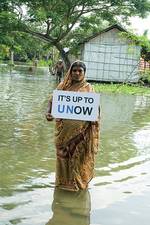 | |
Photo CC Oxfam International |
In the UK, low lying land such as coastal regions of East Anglia, or even central London may be more at risk of flooding. Elsewhere in the world, millions of people could lose their homes because the land they live on becomes too dangerous to live on. Some islands as in the Seychelles may disappear under water and ![]() large parts of Bangladesh may become uninhabitable.
large parts of Bangladesh may become uninhabitable.
Water supplies changing
Water supplies changing
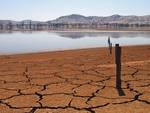 | |
Lake Hume only 4% full. Photo CC suburbanbloke |
Where people live depends on the weather. Where it rains we can grow food, where it doesn't we can't live. Cities often grow up next to major rivers. Climate change may both drastically change the amount of water available and, crucially, where it is.
Australia This is already happening in Australia in the Murray River basin, where a huge area of farmland that supplied much of Austrlia's grain is turning into desert, because the rains have gone. This has already been called the first climate disaster in the developed world. ![]() Find out more
Find out more
The River Nile provides the water for millions of people in north Africa and there is evidence that it is shrinking due to climate change. This has happened before during a previous climate shift, when roughly 14 thousand years ago, the river stopped flowing for 1300 hundred years. The lakes Tana (Ethiopia) and Victoria (Tanzania) which are the sources of the Nile stopped filling up, because the rains changed. ![]() Watch this video to find out more.
Watch this video to find out more.
![]() If these rivers dried up, where would all the people who depend on them go?
If these rivers dried up, where would all the people who depend on them go?
Melting permafrost
Melting permafrost
In many parts of the north and south polar regions, the increases in temperature are causing the permafrost to melt. Ground that has been frozen solid for thousands of years is turning to mud.
In Alaska, the people of Newtok are being forced to move their entire village, because without the frozen permafrost, the buildings are literally sinking into the mud and local rivers are eroding the ground so fast that the current village will be swept away. ![]() Watch this video to find out more
Watch this video to find out more
Health - the bad news
|
|
Economy
Economy
The  Stern Report on the economic consequences of climate change was published in October 2006. It calculates that the cost of not doing anything to curb climate change would result in a 5%-20% loss of the world's economic output forever. This would be a result of the worldwide costs of storm damage, flooding, falling crop yields in areas of Africa and the loss of traditional industries such as forestry in sub-tropical regions such as Brazil.
Stern Report on the economic consequences of climate change was published in October 2006. It calculates that the cost of not doing anything to curb climate change would result in a 5%-20% loss of the world's economic output forever. This would be a result of the worldwide costs of storm damage, flooding, falling crop yields in areas of Africa and the loss of traditional industries such as forestry in sub-tropical regions such as Brazil.
By contrast, the cost of limiting climate change right now, could be as little as 1% of the world's economic output over the next 10-20 years. That is still a vast amount of money, but much less than the cost of not doing anything.
War and future conflicts
War and future conflicts
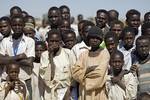 | |
Refugees from the Darfur conflict in 2009. CC Albert Gonzalez Farran |
It is feared that climate change may make some countries much harder places to live in, resulting in conflict and war over access to reduced resources.
Climate change has already been blamed as one cause of the recent war in ![]() Darfur, Sudan. For centuries, farmers have lived alongside nomadic herders, who move their cattle to new pastures. The rain in Sudan has decreased by 30%, hugely reducing the area of land where crops can be grown. This forced the farmers and herders into conflict over access to land and helped trigger a bloody conflict.
Darfur, Sudan. For centuries, farmers have lived alongside nomadic herders, who move their cattle to new pastures. The rain in Sudan has decreased by 30%, hugely reducing the area of land where crops can be grown. This forced the farmers and herders into conflict over access to land and helped trigger a bloody conflict. ![]() Find out more.
Find out more.
Read this article: ![]() Climate 'is a major cause' of conflict in Africa
Climate 'is a major cause' of conflict in Africa
ETHICAL ISSUES INVOLVED
Click on the map to see vulnerable Bangladesh is to rising water.
Map by Robert A. Rohde / Global Warming Art


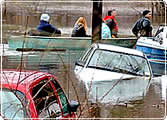
 Hurricane Katrina
Hurricane Katrina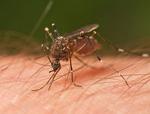
 Effects on agriculture
Effects on agriculture


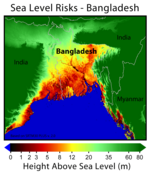
What's your opinion?
Average rating




Not yet rated